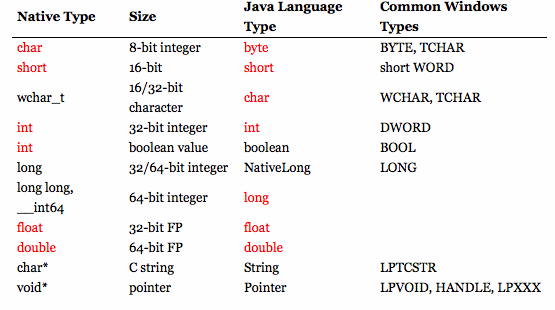Como faço para incluir arquivos dll em um projeto em Java utilizando o Eclipse?
-
Deseja incluir e utilizar métodos dela?– RicardoCommented 16/07/2015 às 12:14
-
Isto mesmo ricardo. Estou tentando acessar a porta serial através da biblioteca jSSC, e esta biblioteca possui o arquivo jSSC-2.8_x86_64.dll no qual devo adicionar ao projeto. Quando adicionar, como posso incluir e utilizar os métodos dela?– DudsCommented 16/07/2015 às 12:54
Adicione um comentário
|
1 Resposta
Você deve usar umas das APIs JAVA disponíveis para acessar código nativo, são essas:
JNI (Java Native Interface) e JNA (Java Native Access).
JNI é a API oficial do Java (Oracle) e JNA é open source mantido pela comunidade.
Enquanto ambos tem o mesmo objetivo, o desenvolvimento do JNA foi focado em simplificar ao máximo a implementação, problema comum na implementação usando JNI.
Eu recomendo a utilização de JNA para você atingir seu objetivo, segue um exemplo que você pode usar como referencia a sua implementação:
Exemplo de aplicação nativa em C++ originador da DLL
#include "simpleDLL.h"
#include <stdexcept>
using namespace std;
namespace simpleDLLNS
{
char simpleDLL::giveVoidPtrGetChar(void* param)
{
if(param != 0)
{
char* paramChrPtr = (char*)param;
return *paramChrPtr;
}
else
{
return 'x';
}
}
int simpleDLL::giveIntGetInt(int a)
{
return 2*a;
}
void simpleDLL::simpleCall(void)
{
int x = 3;
return;
}
int simpleDLL::giveVoidPtrGetInt(void* param)
{
if(param!=0)
{
int* x = (int*)param;
return *x;
}
else
{
return -1;
}
}
}
Chamada JNA a métodos da DLL acima:
package jnahelloworldtest;
import com.sun.jna.Library;
import com.sun.jna.Native;
import com.sun.jna.NativeLong;
import com.sun.jna.Platform;
import com.sun.jna.*;
/** Simple example of native library declaration and usage. */
public class Main {
public interface simpleDLL extends Library {
simpleDLL INSTANCE = (simpleDLL) Native.loadLibrary(
(Platform.isWindows() ? "simpleDLL" : "simpleDLLLinuxPort"), simpleDLL.class);
// it's possible to check the platform on which program runs, for example purposes we assume that there's a linux port of the library (it's not attached to the downloadable project)
byte giveVoidPtrGetChar(Pointer param); // char giveVoidPtrGetChar(void* param);
int giveVoidPtrGetInt(Pointer param); //int giveVoidPtrGetInt(void* param);
int giveIntGetInt(int a); // int giveIntGetInt(int a);
void simpleCall(); // void simpleCall();
}
public static void main(String[] args) {
simpleDLL sdll = simpleDLL.INSTANCE;
sdll.simpleCall(); // call of void function
int a = 3;
int result1 = sdll.giveIntGetInt(a); // calling function with int parameter&result
System.out.println("giveIntGetInt("+a+"): " + result1);
String testStr = "ToBeOrNotToBe";
Memory mTest = new Memory(testStr.length()+1); // '+1' remember about extra byte for \0 character!
mTest.setString(0, testStr);
String testReturn = mTest.getString(0); // you can see that String got properly stored in Memory object
System.out.println("String in Memory:"+testReturn);
Memory intMem = new Memory(4); // allocating space
intMem.setInt(0, 666); // setting allocated memory to an integer
Pointer intPointer = intMem.getPointer(0);
int int1 = sdll.giveVoidPtrGetInt(Pointer.NULL); // passing null, getting default result
System.out.println("giveVoidPtrGetInt(null):" + int1); // passing int stored in Memory object, getting it back
int int2 = sdll.giveVoidPtrGetInt(intMem);
//int int2 = sdll.giveVoidPtrGetInt(intPointer); causes JVM crash, use memory object directly!
System.out.println("giveVoidPtrGetInt(666):" + int2);
byte char1 = sdll.giveVoidPtrGetChar(Pointer.NULL); // passing null, getting default result
byte char2 = sdll.giveVoidPtrGetChar(mTest); // passing string stored in Memory object, getting first letter
System.out.println("giveVoidPtrGetChar(null):" + (char)char1);
System.out.println("giveVoidPtrGetChar('ToBeOrNotToBe'):" + (char)char2);
}
}
Tabela de Mapeamento

Mais referencias:
Getting Started with JNA
Fonte do exemplo